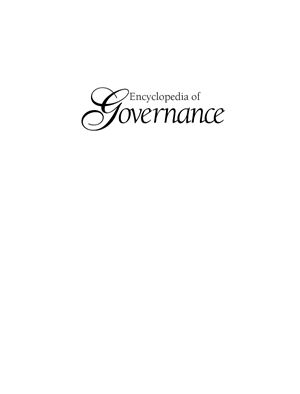SAGE Publications, 2007. 2 vols. 1027 p.
The language of goveance extends to pattes of rule found throughout our daily lives. Goveance also provides us with a language with which to remake our world. We might ask how to make markets, networks, inteational organizations, corporations, and other associations democratically accountable. We might also ask what values we want to uphold in our practices of goveance. It is important for us to address these questions because, by doing so, we make the future.
The Encyclopedia of Goveance provides a one-stop point of reference for the diverse and complex topics surrounding goveance for the period between the collapse of the post-war consensus and the rise of neoliberal regimes in the 1970s. This comprehensive resource concentrates primarily on topics related to the changing nature and role of the state in recent times and the ways in which these roles have been conceptualized in the areas of Political Science, Public Administration, Political Economy, and Sociology.
Key Features:
- Presents a determinedly global scope through approximately 550 entries written by inteational contributors that explicitly address global, regional, and transnational topics; cover theories and concepts that are debated globally; highlight similarities and differences around the world; and offer examples from diverse regions and countries
- Examines the changes in the state associated with the transfer of powers, rights, and functions to organizations within civil society as well as the rise of new types of regional and inteational linkages and problems
- Explores how the state has become both increasingly dependent on organizations in civil society and increasingly constrained by inteational linkages
- Avoids the jargon that characterizes most writing in the field and translates this language into a more familiar and commonsense vocabulary so as to make it intelligible to a wider audience
- Offers comprehensive coverage of topics including policy analysis, public sector management, sociological theory, economic goveance, democratic theory, security, and global goveance
The language of goveance extends to pattes of rule found throughout our daily lives. Goveance also provides us with a language with which to remake our world. We might ask how to make markets, networks, inteational organizations, corporations, and other associations democratically accountable. We might also ask what values we want to uphold in our practices of goveance. It is important for us to address these questions because, by doing so, we make the future.
The Encyclopedia of Goveance provides a one-stop point of reference for the diverse and complex topics surrounding goveance for the period between the collapse of the post-war consensus and the rise of neoliberal regimes in the 1970s. This comprehensive resource concentrates primarily on topics related to the changing nature and role of the state in recent times and the ways in which these roles have been conceptualized in the areas of Political Science, Public Administration, Political Economy, and Sociology.
Key Features:
- Presents a determinedly global scope through approximately 550 entries written by inteational contributors that explicitly address global, regional, and transnational topics; cover theories and concepts that are debated globally; highlight similarities and differences around the world; and offer examples from diverse regions and countries
- Examines the changes in the state associated with the transfer of powers, rights, and functions to organizations within civil society as well as the rise of new types of regional and inteational linkages and problems
- Explores how the state has become both increasingly dependent on organizations in civil society and increasingly constrained by inteational linkages
- Avoids the jargon that characterizes most writing in the field and translates this language into a more familiar and commonsense vocabulary so as to make it intelligible to a wider audience
- Offers comprehensive coverage of topics including policy analysis, public sector management, sociological theory, economic goveance, democratic theory, security, and global goveance

